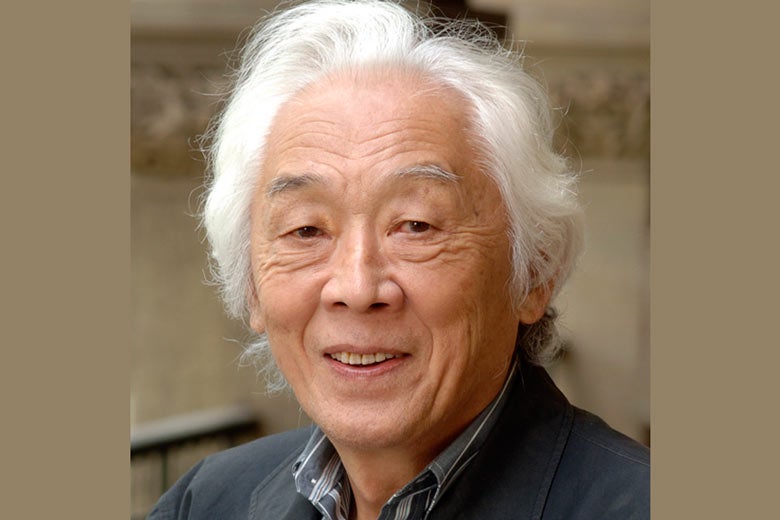Masahiko Aoki, a Stanford economist who forged new ways of thinking about organizations, institutions and East Asian economies, died in Palo Alto on July 15. He was 77, and recently had been hospitalized for lung disease.

Stanford economist Masahiko Aoki, who died July 15, was remembered as a prolific and dedicated scholar. (Image credit: Rod Searcey)
Aoki was a founder of comparative institutional analysis, which explores issues, perspectives and models of institutions within the economy. He studied economic systems, corporate governance and East Asian economies, and developed the “theory of the firm” to compare organizational structures in the corporate world.
Aoki was the Henri and Tomoye Takahashi Professor of Japanese Studies and Professor of Economics, emeritus, and senior fellow at the Stanford Institute of Economic Policy Research and the Freeman Spogli Institute for International Studies. He came to Stanford in 1967 as an assistant professor, and also had appointments at Harvard University and at Kyoto University in Japan. Aoki retired to emeritus status at Stanford in 2005.
Scholar, institution builder
Aoki’s colleague, Stanford economist Takeo Hoshi, described him as a prolific and dedicated scholar. “Even at the hospital, he worked on revising his most recent paper that examines institutional development in China and Japan from the late 19th century to the early 20th century,” said Hoshi, the Henri and Tomoye Takahashi senior fellow at Stanford’s Freeman Spogli Institute for International Studies.
Hoshi noted, “Masa was the first scholar to apply rigorous theoretical tools in modern economics to study of the Japanese economy.” This led Aoki to develop, along with his Stanford colleagues, the framework behind comparative institutional analysis, which can be applied to any economic system, he added.
For Hoshi, Aoki was the “biggest reason why I decided to focus on the study of the Japanese economy in my career almost 30 years ago, and why I moved to Stanford a couple of years ago to be the director of the Japan Program at Asia-Pacific Research Center.”
Aoki was the inaugural director of the Japanese Studies Program at the Walter H. Shorenstein Asia-Pacific Research Center (APARC) when it was re-established in 2011.
John Shoven, the director of the Stanford Institute for Economic and Policy Research, said Aoki was both an accomplished scholar and institution builder.
“He is widely respected all over the world, and was able to span the worlds of economic theory and applied economic policy. We have lost both a friend and one of the world’s leading economists,” Shoven said.
Aoki’s passing represents “a loss to economics, to Stanford and to me personally,” said Stanford economist Kenneth J. Arrow, 1972 winner of the Nobel Prize in economic sciences.
“His most important contributions were to the analysis and understanding of organizational forms in economic life. Aoki particularly studied the contrasting forms of economic organization in the United States and Japanese economies. His work was informed by a deep understanding of economic theory,” said Arrow, the Joan Kenney Professor of Economics and Professor of Operations Research, emeritus.
Leadership roles
In his 2001 work, Toward a Comparative Institutional Analysis, Aoki developed a new approach to analyze how institutions evolve, why institutional structures are diverse across economies, and what factors lead to institutional change or inflexibility.
Aoki’s most recent book Corporations in Evolving Diversity: Cognition, Governance, and Institutions, was published in 2010.
Aoki was born in Nagoya, Aichi Prefecture, in 1938. He graduated from the University of Tokyo with bachelor’s and master’s degrees in economics, in 1962 and 1964, respectively, and a doctoral degree in economics from the University of Minnesota in 1967. In addition to his Stanford career, he held visiting positions at academic institutions in China, Germany, Japan, Sweden and the United Kingdom.
Aoki was president of the International Economic Association from 2008 to 2011, and served as president of the Japanese Economic Association. He was awarded the Japan Academy Prize in 1990 and the sixth International Schumpeter Prize in 1998.
He was the founding editor of the Journal of the Japanese and International Economies, and also founded the Research Institute of Economy, Trade and Industry, and the Virtual Center for Advanced Studies in Institution at the Tokyo Foundation. He was involved in the establishment of the Center for Industrial Development and Environmental Governance at Tsinghua University.
Aoki is survived by his wife, Reiko, of Stanford, and two daughters, Maki, of Boston, and Kyoko, and granddaughter Yuma, of the San Francisco Bay Area.
Media Contacts
Clifton B. Parker, Stanford News Service, 650-725-0224, cbparker@stanford.edu